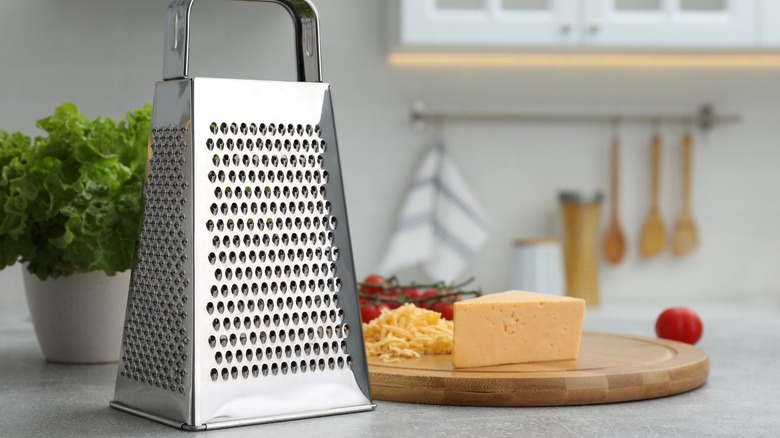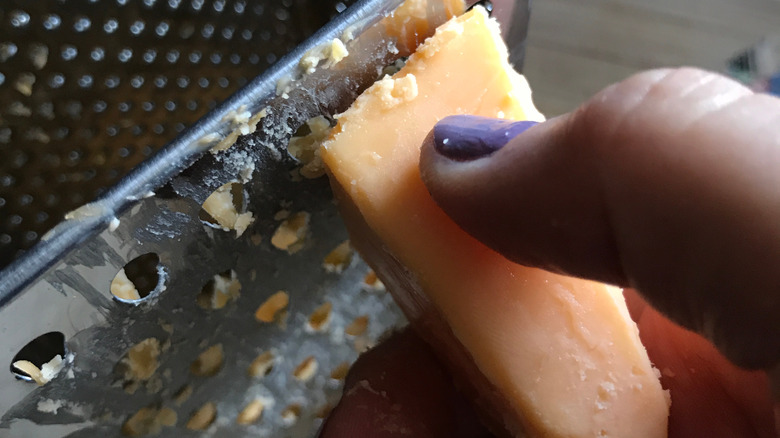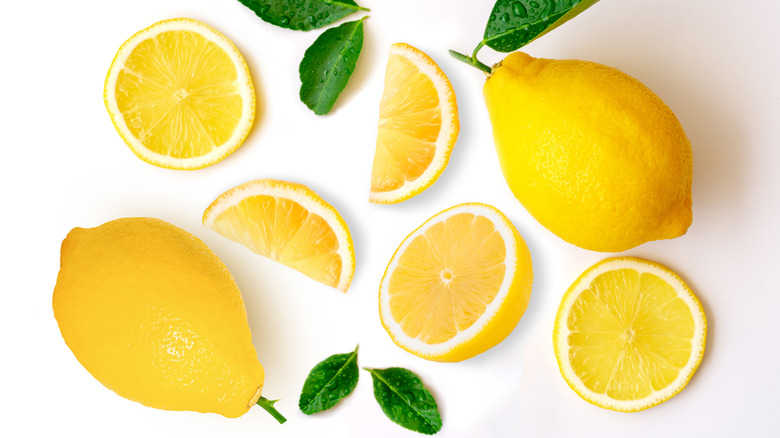The Lemon Trick To Clear All The Food From Your Cheese Grater
If you want to get the most from the cheese you add to recipes, then you should own a cheese grater and know how to use it properly. Pre-shredded cheeses are great for the sake of time and convenience, but they just can't hold a candle to shredding it yourself.
According to Reader's Digest, the reason for this is the ingredients added to pre-shredded cheese. Cellulose is used to coat each strand of shredded cheese to prevent them from caking together while each bag is in storage.
XO & So adds that potato starch is also used for a similar reason, but those aren't the only additives. Natamycin is another compound that is often added to pre-shredded cheese. This one is meant to prevent mold from forming, and like the others will supposedly not affect the flavor. What all of these additives will do is lower the cheese's ability to melt, and reduce the amount of cheese you're paying for. That means an 8-ounce block of cheese will be more productive than an 8-ounce bag of pre-shredded cheese.
If you're going to use a block of cheese for all of your recipes though, you're probably going to want a cheese grater. But while they may work well, they can be frustrating to clean. Thankfully, there's an easy trick that exists to clean out your cheese grater.
How to degunk your cheese grater
There are some good ways to clean a zester or cheese grater, but even doing it properly can still leave you with residue and scraps stuck inside. One easy way to prevent this is to spray your cheese grater with cooking spray before you use it. This will keep things from getting too sticky, but even so, it isn't a perfect solution.
Like most kitchen appliances you'll need to give your cheese grater a deep cleaning from time to time, and it will be much easier if you have a lemon. Food Network says that all you need to do is slice a lemon in half and run it over the parts of the grater that need to be cleaned. The acidity should help break down any stuck-on residue and give the grater a lemon fresh scent as well. Once you've grated the lemon, LifeSavvy says that it can be beneficial to let the lemon juice sit on the grater for five to 10 minutes. After, simply run the grater under the faucet and let it dry before using it again. This way you can grate as much as you want without worrying about the clean up.
Lemons are great natural cleaners
Lemons are well known as a valuable kitchen ingredient, but they're great for cleaning up the kitchen as well. Well + Good notes that lemons are also great for cleaning up cutting boards. Cutting boards are one of the most frequently used items in any kitchen and are used for herbs, vegetables, and meats. All these uses mean they can pick up a lot of residues and smells along the way. The citric acid and other compounds in lemons can help not only clean up this residue but will also aid in addressing strong scents as well.
Cleaning a cutting board with a lemon is fairly easy. Real Simple points out that all you need to do is cut the lemon in half, spread some coarse salt on the board, and then give it a good scrub with the cut side of the lemon. Once you've given the cutting board a good scrub, you can let it sit for five to ten minutes like the cheese grater to let the lemon juices do their work. Then, simply rinse the board down, and dry it as you normally would.
Whether it's a cheese grater or a cutting board, lemons are a powerhouse natural cleaner.


